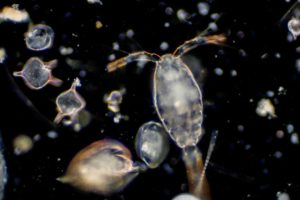

Mark Howarth – July 17, 2022
Scientists have discovered a catastrophic loss of life in our oceans, we can reveal.
An Edinburgh-based research team fears plankton, the tiny organisms that sustain life in our seas, has all but been wiped out after spending two years collecting water samples from the Atlantic.
The landmark research blames chemical pollution from plastics, farm fertilisers and pharmaceuticals in the water. Previously, it was thought the amount of plankton had halved since the 1940s, but the evidence gathered by the Scots suggest 90% has now vanished.
The scientists warn there are only a few years left before the consequences become catastrophically clear when fish, whales and dolphins become extinct, with grave implications for the planet. In the report, the researchers from the Global Oceanic Environmental Survey Foundation (Goes) state: “An environmental catastrophe is unfolding. We believe humanity could adapt to global warming and extreme weather changes. It is our view that humanity will not survive the extinction of most marine plants and animals.”
The findings have prompted calls for urgent action on a number of fronts as observers warn the promises of Cop26 to ease the climate crisis have, so far, amounted to little.
Fiona Nicholls, an oceans campaigner for Greenpeace UK, said: “Our oceans can be our allies in fighting climate change, but there is simply no time to waste.”
Goes – based at Edinburgh University’s Roslin Innovation Centre in Midlothian – has been collecting samples from the Atlantic and the Caribbean from its yacht, Copepod. Setting out from Scotland, it sailed along French and Portuguese coasts before crossing the Atlantic. The yacht is currently moored in Cartagena, Colombia, before setting sail for Panama this week.
In addition to their own samples, the Goes researchers have provided monitoring equipment to other sailing boat crews so that they can perform the same trawls and report back with their results.

